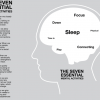Since using amphetamines years ago I have lacked patience, enjoyment and motivation. I was a heavy user for almost a year and upon ceasing only found fish oil to help.
I have recovered probably 75% since then most in the first two years but I'm no where near 100%, in fact I think after the first two years it's been a very gradual decline in my level of functioning, like instead of doing 3 things in a day I will do only one spending too much time at home.
Right now sertraline helps also and I continue to take fish oil as well as do numerous mindfulness exercises but I mostly lack motivation and enjoyment which really sucks.
Having protein at every meal as well as drinking vegetable or fruit smoothies helps only minimally.
I don't want to use any research chemicals or nootropics, I'm after more natural and long term healing supplements similar in effect to fish oil.
If anyone has any experience with this problem and has any suggestions I would love to hear them, thanks.






























































